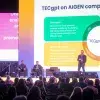On the second edition of AI Day, directors, faculty, and staff from Tecnológico de Monterrey have presented themost important advances from the institution’s artificial intelligence (AI) ecosystem.
Under the motto “The Transformative Power of AI in Education,” AI Day 2025 gathered leaders in AI and trends in education to explores the impact of this technology on the teaching-learning process, research, and efficiency.
“Last year, artificial intelligence was at a controversial stage, above all for universities,” said Carles Abarca, Vice President of Digital Transformation at the Tec, in his opening address.
“It’s now at a completely different stage, where it’s not only involved in the composition of everything, but it is already changing the world,” he added.
CONECTA shares outstanding moments from AI Day 2025, including the presentation of innovations such as the TECgpt ecosystem, holographic TECBot, Skill Studio, and Agent Studio.

LEE TAMBIÉN:
1. TECgpt ecosystem: Innovation in generative AI
During the event, the second phase of the TECgpt project was presented, which has been dubbed the TECgpt ecosystem as a whole.
This ecosystem includes the holographic version of TECBot, a digital assistant from the institution that enables voice interaction, multimedia deployment, and visual recognition, providing an immersive experience to assistants.
Also launched was TECgpt Portal, a platform that includes Skill Studio and Agent Studio, which is designed to enable faculty, researchers, and staff to generate automated skills that optimize their productivity.
These three software programs will be available from March 28, and their use is focused on teaching at the moment.

2. Launch of holographic version of TECBot
The holographic version of TECBot, the institutional digital assistant that facilitates user interaction with institutional information, was launched with a 3D image and voice interface.
Manuel Terán, Artificial Intelligence Platforms Manager at the Tec, said that the artificial intelligence tool incorporates the cognitive elements of speech-to-text and text-to-speech conversion into the tool.
“This means you can speak to TECBot and it understands you and answers you. (What’s more), we’ve added facial recognition models,” he mentioned.
“If you approach the assistant or turn on the camera, it’s not going to wait for you to ask it what you need, but will ask you proactively,” added Luz Eunice Ángeles, Software Components Leader at the Tec.
The speakers said that this version is therefore a more pleasant and attractive multimedia visual interface, whose body movements are synchronized to the content, which is currently limited to services.
Since its launch in September 2023, TECgpt has been adopted by 14,000 users, while TECBot has benefited 81,000 people.
3. Development of new Skill Studio tool
Skill Studio is a platform that enables sophisticated and reusable prompts (skills) to be generated that focus on performing a specific task by sending instructions to the internal generative AI model, said Terán.
“It’s a sophisticated prompt that’s packed into a mini application. When you execute it, you change the input parameters and it gives you a different result, which makes it reusable and shareable,” he added.
Besides extending the use of this tool to more users, Terán mentioned that each skill can:
- Read files.
- Extract content from URLs.
- Perform internet searches.
- Convert text to speech.
- Choose the level of creativity.
“When the skill has been created, its owner can share skills by email or in groups with read or write permissions and even post it on the TECgpt Portal. Skills may also be certified by groups of syllabus experts.
“Skill Studio is constantly evolving, and new features are regularly added based on user feedback to ensure that the tool remains relevant and useful for the community,” said Terán.
“Today, artificial intelligence is not just a topic of conversation, but a driver of global change.” - Carles Abarca
4. Agent Studio: A tool for creating your own agent
Ángeles presented alongside Terán one of the new additions to the TECgpt ecosystem, a solution designed for creating your own personal agent based on generative AI features.
According to the speakers, these agents can be set up with your own personality and trained with your own information simply, flexibly, and securely.
“These agents can interact with users and connect to different services and APIs. This enables agents to not only answer questions but also perform actions based on the information they’re given,” clarified Luz Eunice.
“Besides different levels of creativity, agents can have short-term and long-term memory, which enables them to recall relevant information and improve their interactions over time,” she explained.
Similarly, the aim is for agents to connect to other services and systems, extending their feature set once they are open to the community (they are currently at a limited early adoption stage).

5. Upcoming launch of TECgpt Open Edition
“We’re about to launch the TECgpt Open Edition initiative, which is currently under construction and should be ready in a couple of months. We hope to be in a position to start this pilot for the next AI Day or IFE Conference,” said Terán.
This initiative is based on what Terán calls an institutional philosophy centered on releasing the community’s potential by utilizing or making use of generative AI in a simple, self-managed, and low-code fashion.
“We’re not focused on generating these big, complex, monolithic products, but on seeing how to offer these types of solutions so that everyone can make use of them very quickly,” he added.
6. AI Global Education Network (AIGEN)
Escamilla once again drew attention to the announcement of the AI Global Education Network (AIGEN), a network launched during IFE Conference 2025 with 50 members from 10 countries (31 of whom are now formal members).
AIGEN is an initiative from the Living Lab & Data Hub at Tec de Monterrey’s Institute for the Future of Education (IFE) in partnership with Microsoft.
“This network seeks the same thing as the AI Nexus initiative, which is part of IFE, where we have everything to do with artificial intelligence in education, skills development, both in general terms and in subject syllabuses.”
“We’ve now formed a Steering Committee with seven members, applied to the Spencer Foundation for a Vision Grant, received 27 use cases for TECgpt, and chosen ten to document for pilot use,” he remarked.
According to the director, AIGEN now represents a significant effort to integrate AI into the educational environment, promoting collaboration between universities and the development of innovative solutions that benefit the educational community.
This network brings together ten universities from Mexico and Ibero-America to facilitate the adoption of AI tools and platforms through TECgpt.
Participating institutions and their projects include:
- Autonomous University of Baja California: Using AI to teach visual identity in graphic and industrial design.
- Autonomous University of Tamaulipas: Implementing the Program for Strengthening Social Entrepreneurship (PFOES).
- Chetumal Model University: Developing clinical cases with AI to strengthen critical thinking in dentistry.
- National Autonomous University of Mexico: Applying TECgpt to the development of clinical reasoning in medical students.
- Austral University (Argentina): Using TECgpt to detect and follow at-risk educational pathways.
- Autonomous University of Chile (Chile): Implementing smart adaptive routes to reduce achievement gaps in Health Sciences.
- University of Los Andes (Chile): Applying generative AI to adaptive learning and formative assessment.
- University of Cuenca (Ecuador): Developing educational content with TECgpt and Skill Studio.
- Open University of Catalonia (Spain): Creating authentic assessment scenarios based on real problems.
- Peruvian University of Applied Sciences (Peru): AI-assisted creation of a curriculum based on market analysis and international benchmarking.

7. Skill Studio used to design training units in 2026 syllabuses
Verónica Pérez, Educational Innovation leader, and Miriam Villarreal, Director of Pedagogical Design and Architecture, joined Tec professors to discuss how to use Skill Studio in teaching practice for 2026.
“When we started the planning process to design training units on the 2026 syllabuses, we decided it was important for teachers to have an AI support tool for that process,” said Villarreal.
This being the case, they created a kit comprising 16 skills to facilitate the design of training units (TUs) at different stages and tasks, which is aimed at the professors who design them.
These skills include:
- Creating a problem situation.
- Creating an abstract of your presentation.
- Designing evidence.
- Designing the feedback plan.
- Designing challenges.
- Modularizing the block.
- Designing evaluation instruments.
- Creating AI-use references.
- Designing TU strategy.
- Presenting content.
- Designing cross-cutting skills.
- Developing teaching materials.
- Designing Digital Learning Experiences.
- Designing assessable activities.
- Designing quizzes for different purposes.
- Preparing images.
8. Companies and universities reevaluating future skills
According to Bruce Thompson, Microsoft Education Director for the Americas, 72% of education employees report that they lack the time and energy to do their jobs, with 77% prepared to assign a large part of this work to AI.
However, this does not mean replacing the human element when training professionals. On the contrary, it is a sign of a paradigm shift for new professionals.
“AI won’t replace teachers. It will instead act as an assistant to optimize their work and repetitive tasks. AI will enable them to focus on teaching and mentoring students,” said Thompson.
“82% of leaders share that their employees will require new skills to prepare themselves for the arrival of artificial intelligence,” he added.
This being the case, Thompson identified seven key skills for the future:
- Critical analysis
- Flexibility
- Emotional intelligence
- Creative development
- Intellectual curiosity
- Detecting and managing bias in AI models
- Prompt creation

9. Tec de Monterrey shines for its use of educational AI
During his online talk, Microsoft director Bruce Thompson shared some of the success stories he has identified from universities that he considers have made effective use of AI as part of their educational programs.
On the international stage, the director highlighted Tec de Monterrey’s use of Azure OpenAI, denoting a high level of complexity on a par with institutions such as Northern Alberta IT and Germany’s International University.
“What stands out is the use of Azure as part of a chatbot for services with Skill Studio, which can be adopted both by faculty and students,” said Thompson.
Similarly, the speaker applauded its use of AI in the agent environment, mentioning how these artificial intelligence assistants are considered the next step in AI due to their potential for optimizing processes and improving productivity.
“In their most advanced version, agents will be able to operate independently, plan dynamically, orchestrate other agents, learn, and scale this learning,” he explained.
10. Tec de Monterrey and Oracle join forces in continuing education with AI
In his presentation, Alexandre Nakahara, AI & Cloud Solution Senior Director at Oracle, mentioned collaborating with the Tec to offer a continuous learning opportunity under a joint philanthropic educational program.
“This is a joint program with the Tec that’s open to everyone to promote technological competition, innovation, and education, as well as diversity and inclusion,” said Nakahara.
Through this training program, participants will be able to acquire concrete knowledge of Oracle Cloud Infrastructure (OCI), databases, artificial intelligence (AI), and data management.
In order to strengthen their professional profiles in Mexico’s constantly changing digital environment, over 3,000 educational institutions participate in the program, which includes over 500,000 Mexican students.
This free initiative has an integrated focus on strengthening skills in emerging technologies, reaching 6.3 million students in over 130 countries.
Moreover, Nakahara stated that Oracle is currently merging its cloud with generative AI to offer innovative solutions to companies and even entrepreneurs:
“Our AI models are applied in diverse sectors, from medicine to commerce and disaster prevention. What’s more, this infrastructure enables us to interconnect with other clouds, extending their scope and benefits.”

11. AI is imperative for designing syllabuses
On a panel moderated by Irving Hidrogo, Director of Educational AI at the Tec, panelists reflected on the growing role of artificial intelligence tools in designing academic syllabuses.
The panel comprised:
- María José Pineda, Director of Curricular Design and Evaluation
- Beatriz Palacios, Director of Educational Innovation and Digital Learning
- Bertha Saldívar, Director of Educational Technology and Digital Transformation
- Rafael López, Director of Faculty Development and Wellbeing
Pineda and Palacios agreed that failing to prepare students for a world with AI entails significant risks, such as falling behind in comparison with other peers who are qualified, which affects their competitiveness in the job market.
Furthermore, López said that a lack of training on the use and ethics of this technology could lead to a dearth of the necessary critical skills for evaluating and applying these tools responsibly.
Saldívar agreed with this, saying it could also lead to a disconnect between the educational curriculum and the current demands of the market, limiting the ability of institutions to innovate and leading to an obsolete education.
12. Deployment of the TECgpt site for all staff
According to Manuel Terán, Artificial Intelligence Platforms Manager at the Tec, TECgpt has been positioned as an institutional initiative that seeks to integrate generative artificial intelligence into the educational ecosystem.
“This year, we’ve opened a beta version to 300 employees, where we’ve been making adjustments, and it’s now a reality, as all Tec employees and faculty now have simple and secure access to this website,” he explained.
“Everything that we develop in the Tec environment is in our ecosystem, (...) all the information that is cross-referenced is backed up. This gives us a really interesting security feature, as no information leaves the institution or is entered into another model.”
The speaker said that this provides the ability and facility for each employee to create their own mini applicationswhich make use of creative AI in a simple and versatile fashion, as well as the capacity to share them with others.
AI Day 2025
Tecnológico de Monterrey’s Digital Transformation department organized the second AI Day to promote the responsible use of AI in education and to stimulate research in the field.
This event was held on March 28 in the lobby of the Luis Elizondo Auditorium in Monterrey.
Carles Abarca, Vice President of Digital Transformation, took advantage of the occasion to mention that Tec de Monterrey has been a pioneer in the adoption and development of world-transforming technologies.
“Today, artificial intelligence is not just a topic of conversation, but a driver of global change.
“This progress reflects our constant search for innovation, which has made it possible to bridge the gap from experimentation to production with thousands of users and real-world applications which demonstrate that AI is a key tool for the future,” said Abarca.
LEE TAMBIÉN:





